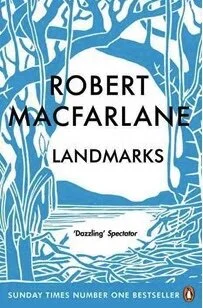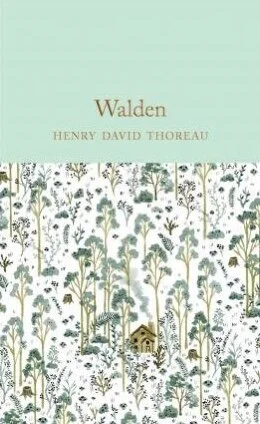Nature Drawing and Journaling
Landmarks
Robert Macfarlane
For years now, the British writer Robert Macfarlane has been collecting place-words: terms for aspects of landscape, nature, and weather, drawn from dozens of languages and dialects of the British Isles. In this, his fifth book, Macfarlane brilliantly explores the linguistic and literary terrain of the British archipelago, from the Shetlands to Cornwall and from Cumbria to Suffolk, offering themed glossaries of hundreds of these rare, deeply local, poetical terms, organized by such geographical terrains as flatlands, uplands, waterlands, coastlands, woodlands, and underlands. Interspersed with this archive of place words are biographical essays in which Macfarlane writes of his favorite authors who have paid close attention to the natural world and who embody in their own work the huge richness of place language.
Walden
Henry David Thoreau
Henry David Thoreau is considered one of the leading figures in early American literature, and Walden is without doubt his most influential book. It recounts the author's experiences living in a small house in the woods around Walden Pond near Concord in Massachusetts. Thoreau constructed the house himself, with the help of a few friends, to see if he could live 'deliberately' - independently and apart from society. The result is an intriguing work which blends natural history with philosophical insights, and includes many illuminating quotations from other authors. Thoreau's wooden shack has won a place for itself in the collective American psyche, a remarkable achievement for a book with such modest and rustic beginnings.
DRAWN TO NATURE
Clare Walker Leslie
Whether it’s a bird hopping along the sidewalk, water droplets glistening on a tree, or the color of the sky outside your kitchen window, Clare Walker Leslie encourages us to notice and appreciate the splendors of nature. Drawn to Nature comprises excerpts from 25 years of Leslie’s journals devoted to observing and recording the natural world in words, field sketches, and impressionistic watercolors. Delightfully amusing and deeply passionate by turns, this compilation will inspire you to connect with nature, wherever you live.
The Laws Guide to Drawing birds
John Muir Laws
Drawing birds opens a world of beauty and sharpens our ability to observe accurately and deeply. The ability to draw is not a gift you are born with but a skill that anyone can develop. Whether you are a birder wishing to quickly sketch birds or an artist who want to understand and accurately depict birds in your paintings this is the book for you. The demonstrations and material in this book has been developed and refined in hundreds of workshops and will give you the techniques and knowledge you need to draw birds.
THE FIELD GUIDE TO DRAWING AND SKETCHING ANIMALS
Tim Pond
There are some very good books written on life drawing, yet when it comes to drawing wildlife, illustrators and artists often revert to working solely from photographs, which can leave the artwork looking lifeless and flat. In this inspirational book, artist Tim Pond shows you how to observe and draw animals in zoos, farms, wildlife parks and aquariums, teaching you some fascinating facts about the animals along the way and ultimately bringing you closer to nature.
One of the challenges with sketching wildlife is that animals are constantly moving, however having some basic understanding of the biology of an animal.
WELCOME TO NEW ZEALAND: A NATURE JOURNAL
Sandra Morris
Kids love to be outside, but it’s easy to miss all the astounding wonders of nature, unless you look closely. Have you ever noticed that ladybugs have different numbers of spots? When you look at a leaf, what do you see: is it pointed or round, long or short, soft or hard? In this stunning idea book, acclaimed author and illustrator Sandra Morris shares her love for the flora and fauna of her native New Zealand and encourages budding scientists to record their own discoveries in creative ways, no matter where they live. Back matter includes a glossary, an index, and a bibliography.
HOW TO KEEP A NATURALIST NOTEBOOK
Susan Leigh Tomlinson
For nature-lovers, birders, and students of wildlife and biology, keeping a field notebook is essential to accurately recording observations of nature from a personal perspective. This one-of-a-kind guide offers detailed instruction on how to keep a naturalist's notebook that will be immensely valuable to anyone who wants to know more about the natural world. What to look for in the wild, what information should be recorded and how to organize it, basic drawing skills using line and color, incorporating maps and charts - all these skills and more are covered.
SKETCHING IN NATURE
Cathy Johnson
Featuring simple step-by-step instructions and hundreds of illustrations, this sketching and watercolor primer reveals how creating art can enhance any outdoor experience.
In this inspirational guide, Cathy Johnson, a nationally recognized artist, naturalist and teacher, offers personal anecdotes, exercises and useful tips that are perfect for every amateur artist. This book covers a wide range of subjects, including:
WINGS, WORMS &WONDER
Kelly Johnson
Peppered with anecdotes and friendly advice, while based in research and experience, Wings, Worms, and Wonder: A Guide for Creatively Integrating Gardening and Outdoor Learning answers this question.
Above and beyond gardening guidance on topics such as composting and organic pest control, it gives adults the tools to reconnect themselves and the children in their lives to the natural world through holistic gardening experiences. It will ignite your confidence to create outdoor learning experiences that nurture both wonder and ecological literacy.









